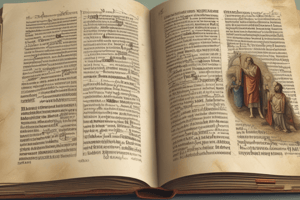Podcast
Questions and Answers
The world through its wisdom came to know God.
The world through its wisdom came to know God.
False (B)
Jews are seeking for signs while Greeks are searching for wisdom.
Jews are seeking for signs while Greeks are searching for wisdom.
True (A)
Christ is referred to as the power of God but not as the wisdom of God.
Christ is referred to as the power of God but not as the wisdom of God.
False (B)
The wisdom of God is incarnate in Jesus.
The wisdom of God is incarnate in Jesus.
Jews consider the message of Christ crucified to be a scandal.
Jews consider the message of Christ crucified to be a scandal.
Jesus acted in accordance with the wisdom of God.
Jesus acted in accordance with the wisdom of God.
The Proverbs are not reflected in the life of Jesus.
The Proverbs are not reflected in the life of Jesus.
Gentiles see the message preached as wise.
Gentiles see the message preached as wise.
Those who are called include both Jews and Greeks.
Those who are called include both Jews and Greeks.
The wisdom of God showed up only in what Jesus said and not in how he acted.
The wisdom of God showed up only in what Jesus said and not in how he acted.
Flashcards are hidden until you start studying
Study Notes
Overview of the Book of James
- The Book of James is considered the first New Testament epistle, likely written in the early 30s AD.
- Addresses Jewish Christians, specifically Messianic Jews who believe in the Messiah, not the nation of Israel as a whole.
- Written to believers, it focuses on practical living and tests of faith.
Audience and Context
- Original recipients were Jewish believers, not Gentiles; emphasized through terms like "twelve tribes" and "synagogue."
- Reflects on the early church context before Gentile inclusion, which became prominent after Acts chapter 10 and the Jerusalem council in AD 49.
- Written with an Old Testament foundation; contains themes familiar to a Jewish mindset.
Themes of Wisdom
- Biblical wisdom is defined as knowledge that leads to proper action, described as "knowledge in action."
- Contrasted between the wisdom of God (heavenly, pure) and worldly wisdom (earthly, demonic).
- Wisdom must manifest through behavior, speech, and actions; mere knowledge without application is incomplete.
Tests of Faith
- The text introduces various tests to gauge living faith, examining the relationship between belief and behavior.
- Highlights the importance of self-control, particularly in speech—what one says reflects adherence to either divine or worldly wisdom.
Characteristics of Wisdom
- True wisdom is demonstrated by good behavior and gentleness (James 3:13).
- World's wisdom is associated with jealousy, selfish ambition, and disorder (James 3:15-16).
- God's wisdom is characterized as pure, peaceable, gentle, merciful, and fruitful (James 3:17-18).
Integration with Proverbs
- Proverbs offers additional context on wisdom, emphasizing how it shapes thought, speech, and action.
- Key verse: "The fear of the Lord is the beginning of knowledge" (Proverbs 1:7).
- Wisdom is described as calling out for attention, urging followers to embrace and seek after it.
The Process of Gaining Wisdom
- Gaining wisdom involves actively seeking understanding and applying biblical principles to life (Proverbs 4:5-7).
- The need for regular engagement with Scripture to acquire wisdom is crucial; spiritual osmosis is insufficient.
Conclusion
- The emphasis on wisdom connects behavior with spiritual integrity; an individual's wisdom will be evident through their actions.
- Encourages believers to continuously seek God's wisdom, especially in challenging situations, to align thoughts, speech, and actions with divine principles.### Wisdom and Understanding
- Wisdom is personified as calling out and seeking attention, as noted in Proverbs 8:1.
- Acquiring wisdom is a process made available by God, often contrary to personal desires or expectations.
- Wisdom is valued more than material wealth; Proverbs 8:11 emphasizes that wisdom surpasses jewels and desirable things.
- Life experiences reveal that without wisdom, material possessions are transient; wisdom provides lasting value beyond earthly life.
Characteristics of Wisdom
- Wisdom is associated with prudence, knowledge, and discretion (Proverbs 8:12).
- The fear of the Lord is fundamental to wisdom; it entails hating evil, arrogance, and deceit (Proverbs 8:13).
- Wisdom's true essence is reflected in actions and speech, highlighting the importance of genuine wisdom in daily life.
New Testament Insights
- Jesus, fulfilling Old Testament prophecy, was born under the law (Galatians 4:4), emphasizing the continuity of Biblical wisdom.
- The term "Sophia" relates to wisdom in the New Testament; it signifies an acquired skill in living and behaving rightly.
- In Matthew 11:19, wisdom is validated through deeds, reinforcing the connection between wisdom in thought and action.
Jesus and Wisdom
- Jesus is positioned as greater than Solomon, indicating a heightened form of divine wisdom (Matthew 12:42).
- His miraculous acts exemplify the wisdom of God, demonstrating where his understanding originated—through the Holy Spirit resting upon him (Isaiah 11:1-2).
The Nature of True Wisdom
- James 3 contrasts divine wisdom with earthly wisdom; true wisdom influences behavior and is marked by gentleness and good deeds.
- Earthly wisdom leads to disorder and conflict, while wisdom from above is characterized as pure, peaceable, and merciful (James 3:17).
- Wisdom is a continual pursuit; even established individuals are still in the process of acquiring wisdom.
Paul on Wisdom
- Paul stresses that worldly wisdom does not lead to knowledge of God (1 Corinthians 1:21).
- Jews seek signs while Gentiles seek wisdom; true understanding comes through the message of the crucified Christ, seen as the wisdom of God (1 Corinthians 1:24).
- Jesus is identified as the embodiment of God’s wisdom (1 Corinthians 1:30), indicating that his life exemplifies the teachings of wisdom from Proverbs.
Implications for Living
- To emulate wisdom in daily life, follow Christ’s example, recognizing that wisdom manifests in thoughts, speech, and actions.
- Wisdom should be sought continually, as it shapes character and decision-making, leading to a deeper understanding of divine truth.
Studying That Suits You
Use AI to generate personalized quizzes and flashcards to suit your learning preferences.




